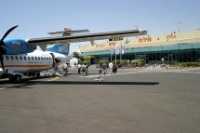The FICC proposed the inclusion in the 2007 budget of a plan to continue the exposure of the Israeli economy to competing imports
As the Government begins its internal 2007 budget preparations, the Federation of Israeli Chambers of Commerce (FICC) submitted last week a wide economic plan to both the Ministry of Finance and to the Ministry of Industry & Trade.
The FICC proposed the inclusion in the 2007 budget of a plan to continue the exposure of the Israeli economy to competing imports.
The FICC believes that the adoption of such policies will not only reduce prices but will also reduce inflationary forces. In 1990 the government adopted a highly successful exposure policy which made Israeli manufacturers goods more competitive in the home market.
Uriel Lynn, president of the Israeli Chambers of Commerce said that the new plan did not require any budget spending. He added that the plan represented the demand of the import sector which wanted customs duties to be cancelled on all manufactured goods, including on imports from third countries, countries with which Israel has no bilateral trade agreements.
Lynn also noted that the new proposal does not include agricultural and food products, which are worldwide protected by quotas.
The FICC economic plan also covers the following issues: The adjustment of the maximum customs duty on imported agricultural and food products, equalization of port fees on imported goods with the port fee applied on exported goods. Or alternatively apply a new port fees based on weight or volume of the cargo. At present imported goods pay port fees assessed at 1.01% of the CIF value whereas exported goods are charged 0.2% of the FOB value. Exports are therefore heavily subsidized by imports, The cancellation of the special levy on imports of food fats & oils, the publication of the terms for import licensing approval procedures.
Lynn: Israeli market is ready for greater import exposure
The FICC proposed the inclusion in the 2007 budget of a plan to continue the exposure of the Israeli economy to competing imports
03.07.06 / 00:00
•
More articles that may interest you

Israel Diamond Industry Awards to be Presented at World Diamond Congress

CAL Cargo Air Lines celebrated 30th anniversary

Israeli-Jordanian new International Airport will replace Eilat airport

Chambers of Commerce: invisible exports up 8% in first quarter

El Al decided to freeze purchasing of new planes

IAA: A new runway and a fourth parking slip will be built at Ben Gurion Airport
More news from Industry & Trade Section
>The Red Cross admitted Israel to the worldwide humanitarian organization/25.06.06
>CBS: Tourism up 25% in January-May 2006/25.06.06
>CBS: Exports to US in March-May rose by annualized 50%/25.06.06
>Central Bank: 2006 growth forecast - 5%/19.06.06
>Israeli and Norwegian Tax Authorities Sign collaboration Agreement/19.06.06
>Wineries association was set up, aiming to double Israeli wine exports/19.06.06
>D&B Procurement Managers Index down in May/19.06.06
>Manufacturers Association: World Cup madness not yet invaded local workplaces/19.06.06
>Qassam rocket attacks at Sderot, affecting local industry/19.06.06
>Ministry of Finance unveils plans to cut VAT by 1%/19.06.06
